Mental Health Hospital: Evaluating and Improving Healthcare Quality
VerifiedAdded on 2022/08/13
|5
|1216
|67
Report
AI Summary
This report, prepared by the head nurse of a mental health hospital, identifies critical issues impacting patient care and overall healthcare quality. The report highlights problems such as insufficient bed capacity, lack of preparedness for emergency cases, and inadequate clinical competence among nursing staff. To address these issues, the report proposes several interventions, including increasing the number of beds, establishing a pact with a general hospital for clinical assistance, conducting comprehensive training sessions for nursing staff, forming a steering committee for policy evaluation, and implementing corrective strategies to improve patient safety. Furthermore, the report emphasizes the importance of continuous improvement through regular evaluation of quality assurance programs and the involvement of all stakeholders. The ultimate goal is to enhance patient outcomes and ensure the highest standards of care within the mental health ward.
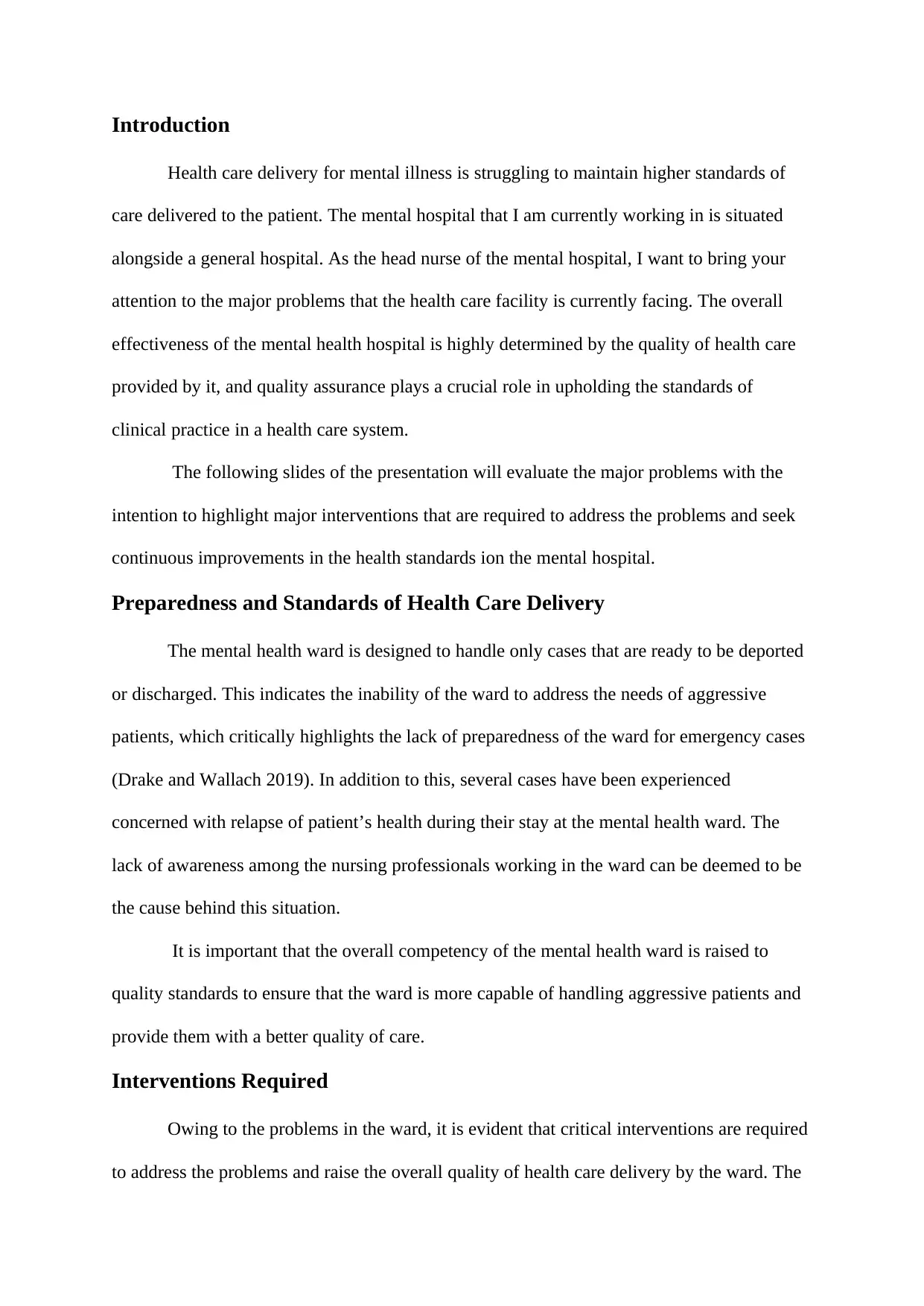
Introduction
Health care delivery for mental illness is struggling to maintain higher standards of
care delivered to the patient. The mental hospital that I am currently working in is situated
alongside a general hospital. As the head nurse of the mental hospital, I want to bring your
attention to the major problems that the health care facility is currently facing. The overall
effectiveness of the mental health hospital is highly determined by the quality of health care
provided by it, and quality assurance plays a crucial role in upholding the standards of
clinical practice in a health care system.
The following slides of the presentation will evaluate the major problems with the
intention to highlight major interventions that are required to address the problems and seek
continuous improvements in the health standards ion the mental hospital.
Preparedness and Standards of Health Care Delivery
The mental health ward is designed to handle only cases that are ready to be deported
or discharged. This indicates the inability of the ward to address the needs of aggressive
patients, which critically highlights the lack of preparedness of the ward for emergency cases
(Drake and Wallach 2019). In addition to this, several cases have been experienced
concerned with relapse of patient’s health during their stay at the mental health ward. The
lack of awareness among the nursing professionals working in the ward can be deemed to be
the cause behind this situation.
It is important that the overall competency of the mental health ward is raised to
quality standards to ensure that the ward is more capable of handling aggressive patients and
provide them with a better quality of care.
Interventions Required
Owing to the problems in the ward, it is evident that critical interventions are required
to address the problems and raise the overall quality of health care delivery by the ward. The
Health care delivery for mental illness is struggling to maintain higher standards of
care delivered to the patient. The mental hospital that I am currently working in is situated
alongside a general hospital. As the head nurse of the mental hospital, I want to bring your
attention to the major problems that the health care facility is currently facing. The overall
effectiveness of the mental health hospital is highly determined by the quality of health care
provided by it, and quality assurance plays a crucial role in upholding the standards of
clinical practice in a health care system.
The following slides of the presentation will evaluate the major problems with the
intention to highlight major interventions that are required to address the problems and seek
continuous improvements in the health standards ion the mental hospital.
Preparedness and Standards of Health Care Delivery
The mental health ward is designed to handle only cases that are ready to be deported
or discharged. This indicates the inability of the ward to address the needs of aggressive
patients, which critically highlights the lack of preparedness of the ward for emergency cases
(Drake and Wallach 2019). In addition to this, several cases have been experienced
concerned with relapse of patient’s health during their stay at the mental health ward. The
lack of awareness among the nursing professionals working in the ward can be deemed to be
the cause behind this situation.
It is important that the overall competency of the mental health ward is raised to
quality standards to ensure that the ward is more capable of handling aggressive patients and
provide them with a better quality of care.
Interventions Required
Owing to the problems in the ward, it is evident that critical interventions are required
to address the problems and raise the overall quality of health care delivery by the ward. The
Paraphrase This Document
Need a fresh take? Get an instant paraphrase of this document with our AI Paraphraser
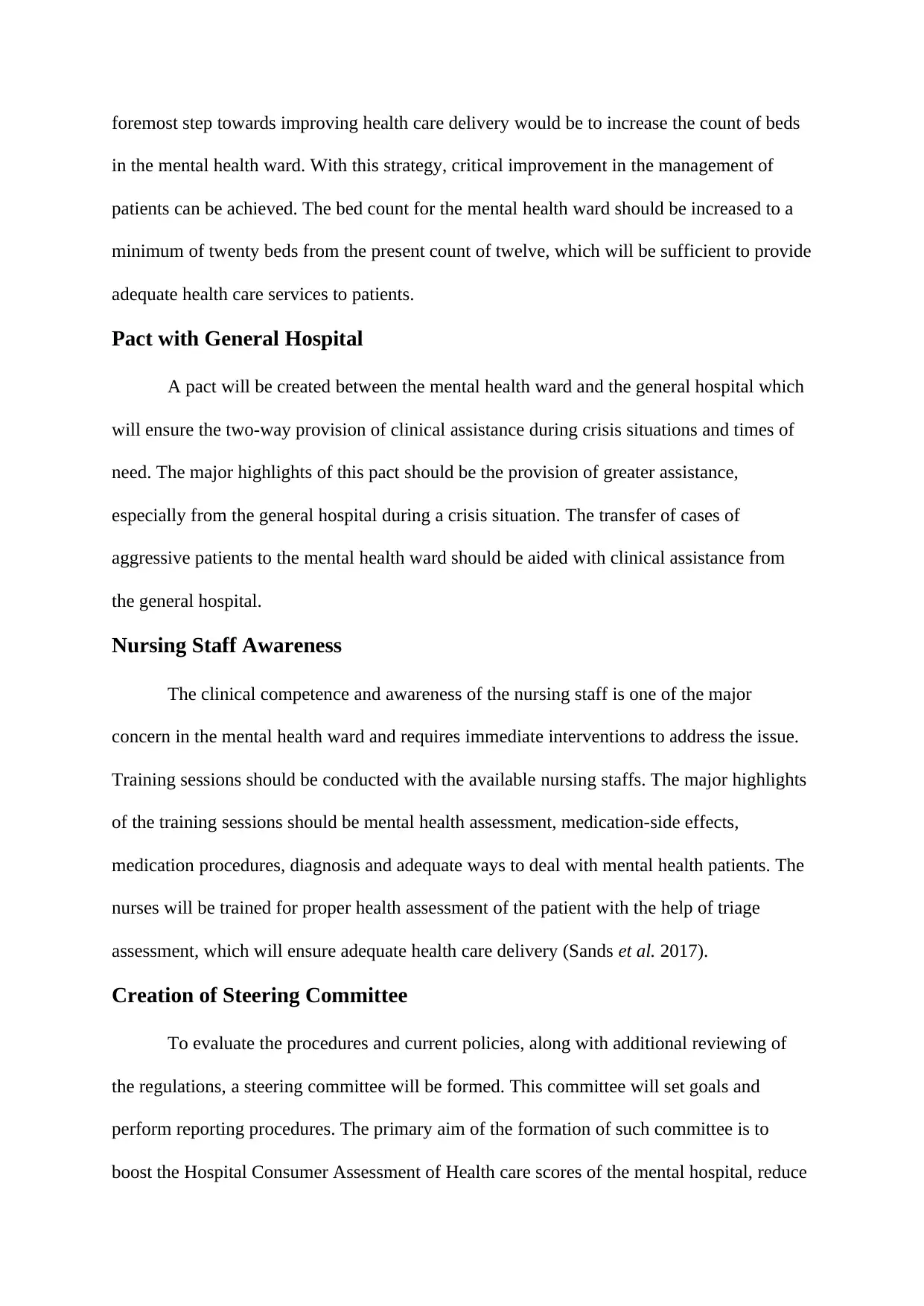
foremost step towards improving health care delivery would be to increase the count of beds
in the mental health ward. With this strategy, critical improvement in the management of
patients can be achieved. The bed count for the mental health ward should be increased to a
minimum of twenty beds from the present count of twelve, which will be sufficient to provide
adequate health care services to patients.
Pact with General Hospital
A pact will be created between the mental health ward and the general hospital which
will ensure the two-way provision of clinical assistance during crisis situations and times of
need. The major highlights of this pact should be the provision of greater assistance,
especially from the general hospital during a crisis situation. The transfer of cases of
aggressive patients to the mental health ward should be aided with clinical assistance from
the general hospital.
Nursing Staff Awareness
The clinical competence and awareness of the nursing staff is one of the major
concern in the mental health ward and requires immediate interventions to address the issue.
Training sessions should be conducted with the available nursing staffs. The major highlights
of the training sessions should be mental health assessment, medication-side effects,
medication procedures, diagnosis and adequate ways to deal with mental health patients. The
nurses will be trained for proper health assessment of the patient with the help of triage
assessment, which will ensure adequate health care delivery (Sands et al. 2017).
Creation of Steering Committee
To evaluate the procedures and current policies, along with additional reviewing of
the regulations, a steering committee will be formed. This committee will set goals and
perform reporting procedures. The primary aim of the formation of such committee is to
boost the Hospital Consumer Assessment of Health care scores of the mental hospital, reduce
in the mental health ward. With this strategy, critical improvement in the management of
patients can be achieved. The bed count for the mental health ward should be increased to a
minimum of twenty beds from the present count of twelve, which will be sufficient to provide
adequate health care services to patients.
Pact with General Hospital
A pact will be created between the mental health ward and the general hospital which
will ensure the two-way provision of clinical assistance during crisis situations and times of
need. The major highlights of this pact should be the provision of greater assistance,
especially from the general hospital during a crisis situation. The transfer of cases of
aggressive patients to the mental health ward should be aided with clinical assistance from
the general hospital.
Nursing Staff Awareness
The clinical competence and awareness of the nursing staff is one of the major
concern in the mental health ward and requires immediate interventions to address the issue.
Training sessions should be conducted with the available nursing staffs. The major highlights
of the training sessions should be mental health assessment, medication-side effects,
medication procedures, diagnosis and adequate ways to deal with mental health patients. The
nurses will be trained for proper health assessment of the patient with the help of triage
assessment, which will ensure adequate health care delivery (Sands et al. 2017).
Creation of Steering Committee
To evaluate the procedures and current policies, along with additional reviewing of
the regulations, a steering committee will be formed. This committee will set goals and
perform reporting procedures. The primary aim of the formation of such committee is to
boost the Hospital Consumer Assessment of Health care scores of the mental hospital, reduce
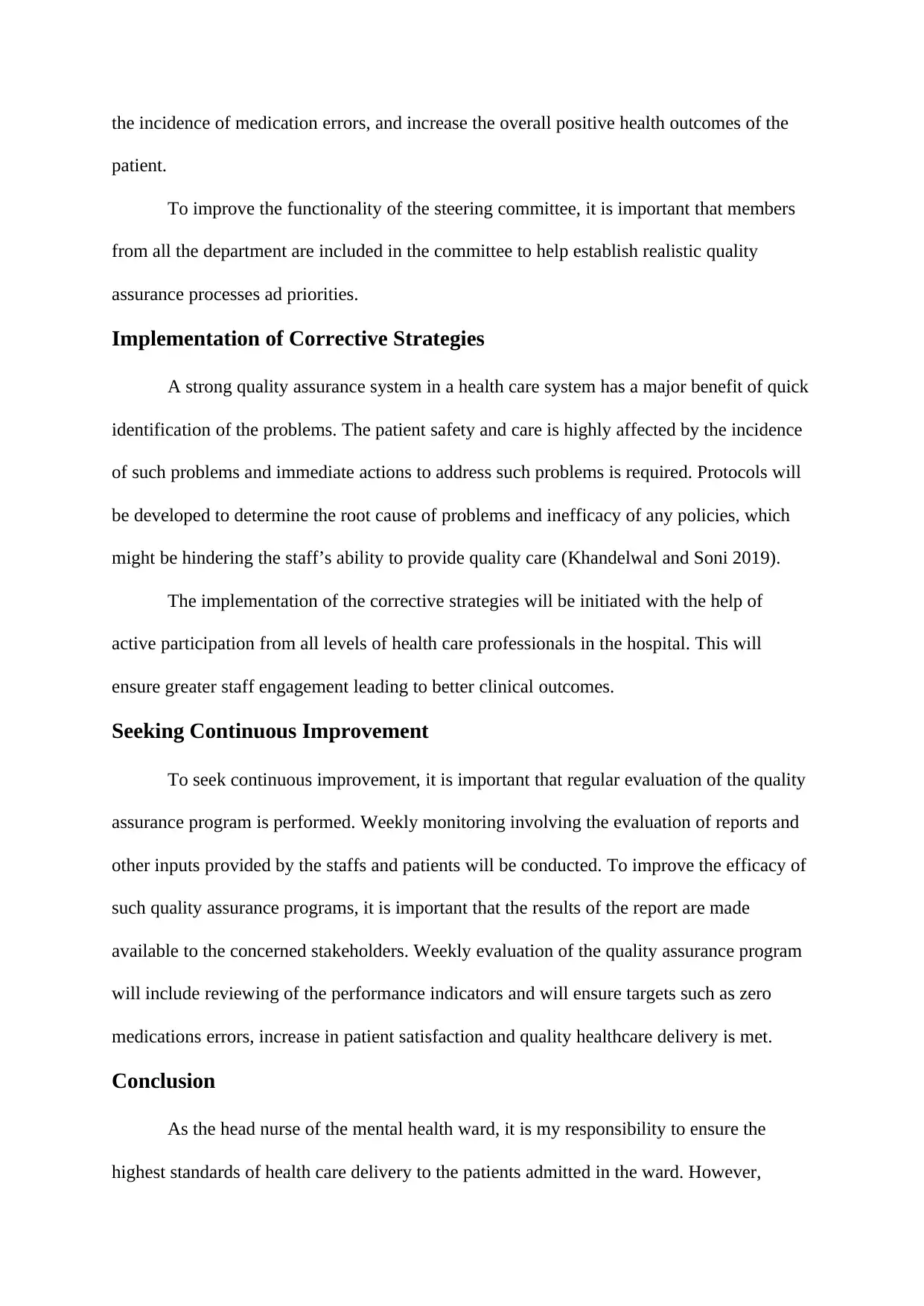
the incidence of medication errors, and increase the overall positive health outcomes of the
patient.
To improve the functionality of the steering committee, it is important that members
from all the department are included in the committee to help establish realistic quality
assurance processes ad priorities.
Implementation of Corrective Strategies
A strong quality assurance system in a health care system has a major benefit of quick
identification of the problems. The patient safety and care is highly affected by the incidence
of such problems and immediate actions to address such problems is required. Protocols will
be developed to determine the root cause of problems and inefficacy of any policies, which
might be hindering the staff’s ability to provide quality care (Khandelwal and Soni 2019).
The implementation of the corrective strategies will be initiated with the help of
active participation from all levels of health care professionals in the hospital. This will
ensure greater staff engagement leading to better clinical outcomes.
Seeking Continuous Improvement
To seek continuous improvement, it is important that regular evaluation of the quality
assurance program is performed. Weekly monitoring involving the evaluation of reports and
other inputs provided by the staffs and patients will be conducted. To improve the efficacy of
such quality assurance programs, it is important that the results of the report are made
available to the concerned stakeholders. Weekly evaluation of the quality assurance program
will include reviewing of the performance indicators and will ensure targets such as zero
medications errors, increase in patient satisfaction and quality healthcare delivery is met.
Conclusion
As the head nurse of the mental health ward, it is my responsibility to ensure the
highest standards of health care delivery to the patients admitted in the ward. However,
patient.
To improve the functionality of the steering committee, it is important that members
from all the department are included in the committee to help establish realistic quality
assurance processes ad priorities.
Implementation of Corrective Strategies
A strong quality assurance system in a health care system has a major benefit of quick
identification of the problems. The patient safety and care is highly affected by the incidence
of such problems and immediate actions to address such problems is required. Protocols will
be developed to determine the root cause of problems and inefficacy of any policies, which
might be hindering the staff’s ability to provide quality care (Khandelwal and Soni 2019).
The implementation of the corrective strategies will be initiated with the help of
active participation from all levels of health care professionals in the hospital. This will
ensure greater staff engagement leading to better clinical outcomes.
Seeking Continuous Improvement
To seek continuous improvement, it is important that regular evaluation of the quality
assurance program is performed. Weekly monitoring involving the evaluation of reports and
other inputs provided by the staffs and patients will be conducted. To improve the efficacy of
such quality assurance programs, it is important that the results of the report are made
available to the concerned stakeholders. Weekly evaluation of the quality assurance program
will include reviewing of the performance indicators and will ensure targets such as zero
medications errors, increase in patient satisfaction and quality healthcare delivery is met.
Conclusion
As the head nurse of the mental health ward, it is my responsibility to ensure the
highest standards of health care delivery to the patients admitted in the ward. However,
⊘ This is a preview!⊘
Do you want full access?
Subscribe today to unlock all pages.

Trusted by 1+ million students worldwide
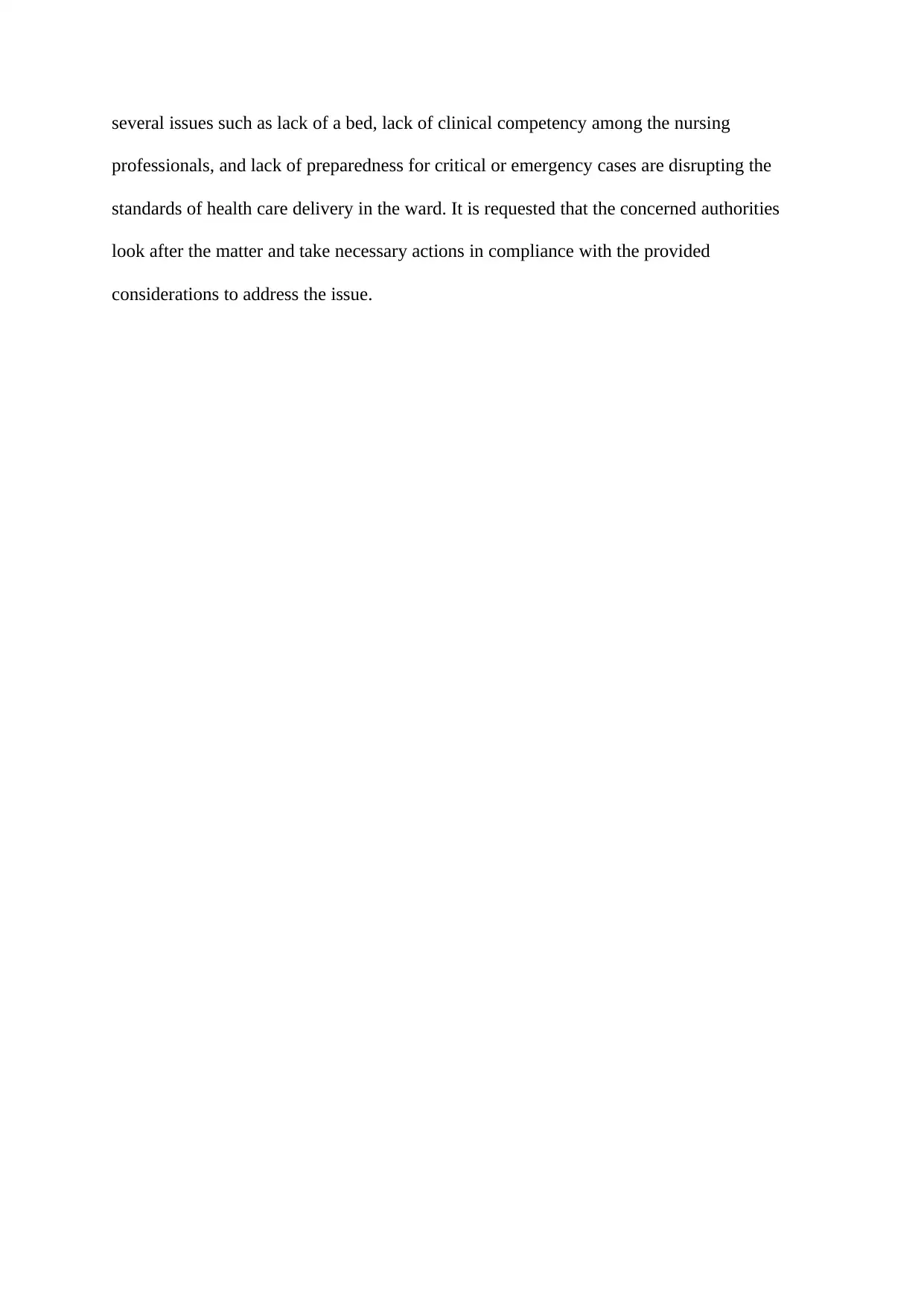
several issues such as lack of a bed, lack of clinical competency among the nursing
professionals, and lack of preparedness for critical or emergency cases are disrupting the
standards of health care delivery in the ward. It is requested that the concerned authorities
look after the matter and take necessary actions in compliance with the provided
considerations to address the issue.
professionals, and lack of preparedness for critical or emergency cases are disrupting the
standards of health care delivery in the ward. It is requested that the concerned authorities
look after the matter and take necessary actions in compliance with the provided
considerations to address the issue.
Paraphrase This Document
Need a fresh take? Get an instant paraphrase of this document with our AI Paraphraser
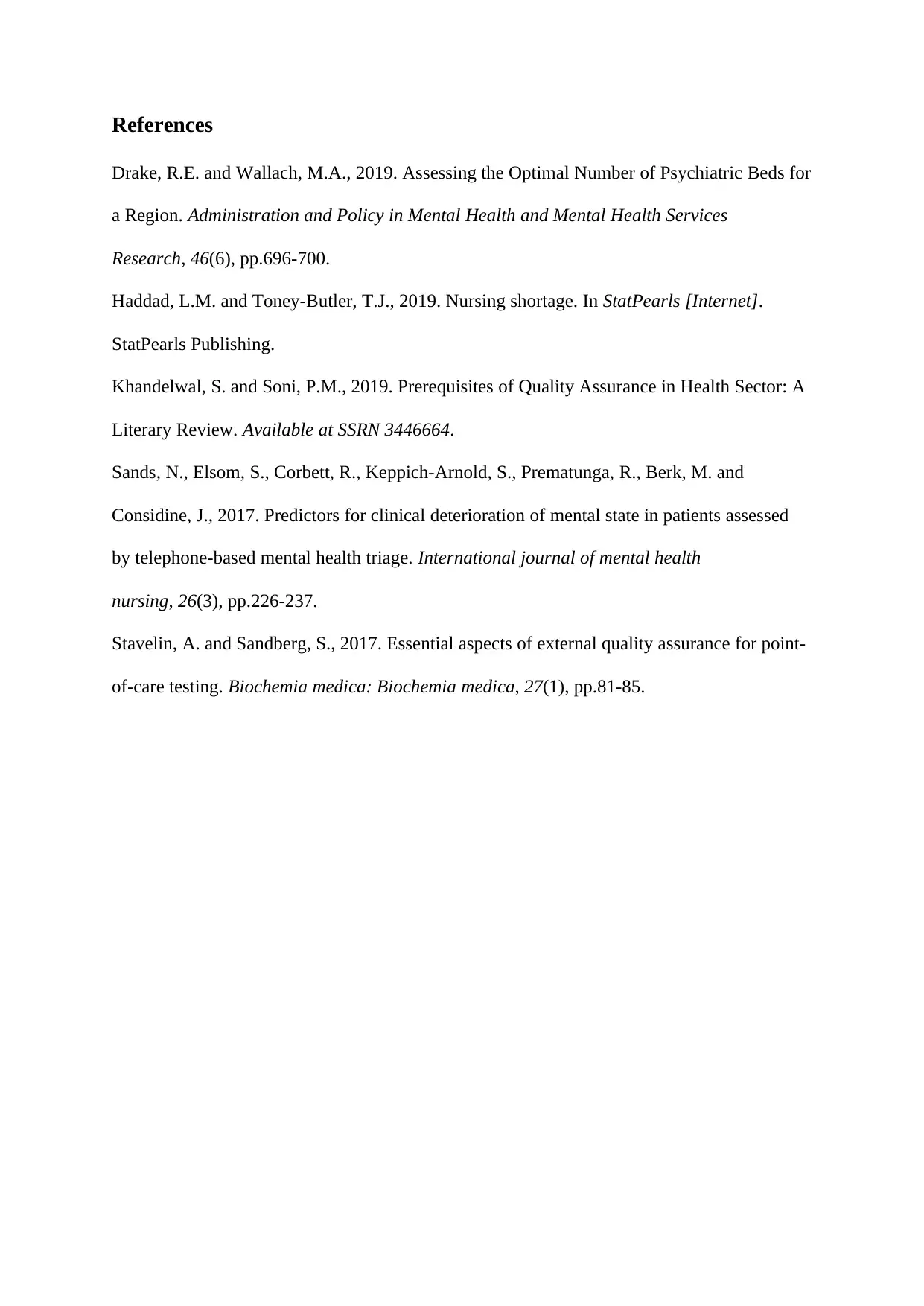
References
Drake, R.E. and Wallach, M.A., 2019. Assessing the Optimal Number of Psychiatric Beds for
a Region. Administration and Policy in Mental Health and Mental Health Services
Research, 46(6), pp.696-700.
Haddad, L.M. and Toney-Butler, T.J., 2019. Nursing shortage. In StatPearls [Internet].
StatPearls Publishing.
Khandelwal, S. and Soni, P.M., 2019. Prerequisites of Quality Assurance in Health Sector: A
Literary Review. Available at SSRN 3446664.
Sands, N., Elsom, S., Corbett, R., Keppich‐Arnold, S., Prematunga, R., Berk, M. and
Considine, J., 2017. Predictors for clinical deterioration of mental state in patients assessed
by telephone‐based mental health triage. International journal of mental health
nursing, 26(3), pp.226-237.
Stavelin, A. and Sandberg, S., 2017. Essential aspects of external quality assurance for point-
of-care testing. Biochemia medica: Biochemia medica, 27(1), pp.81-85.
Drake, R.E. and Wallach, M.A., 2019. Assessing the Optimal Number of Psychiatric Beds for
a Region. Administration and Policy in Mental Health and Mental Health Services
Research, 46(6), pp.696-700.
Haddad, L.M. and Toney-Butler, T.J., 2019. Nursing shortage. In StatPearls [Internet].
StatPearls Publishing.
Khandelwal, S. and Soni, P.M., 2019. Prerequisites of Quality Assurance in Health Sector: A
Literary Review. Available at SSRN 3446664.
Sands, N., Elsom, S., Corbett, R., Keppich‐Arnold, S., Prematunga, R., Berk, M. and
Considine, J., 2017. Predictors for clinical deterioration of mental state in patients assessed
by telephone‐based mental health triage. International journal of mental health
nursing, 26(3), pp.226-237.
Stavelin, A. and Sandberg, S., 2017. Essential aspects of external quality assurance for point-
of-care testing. Biochemia medica: Biochemia medica, 27(1), pp.81-85.
1 out of 5
Related Documents
Your All-in-One AI-Powered Toolkit for Academic Success.
+13062052269
info@desklib.com
Available 24*7 on WhatsApp / Email
![[object Object]](/_next/static/media/star-bottom.7253800d.svg)
Unlock your academic potential
Copyright © 2020–2025 A2Z Services. All Rights Reserved. Developed and managed by ZUCOL.





